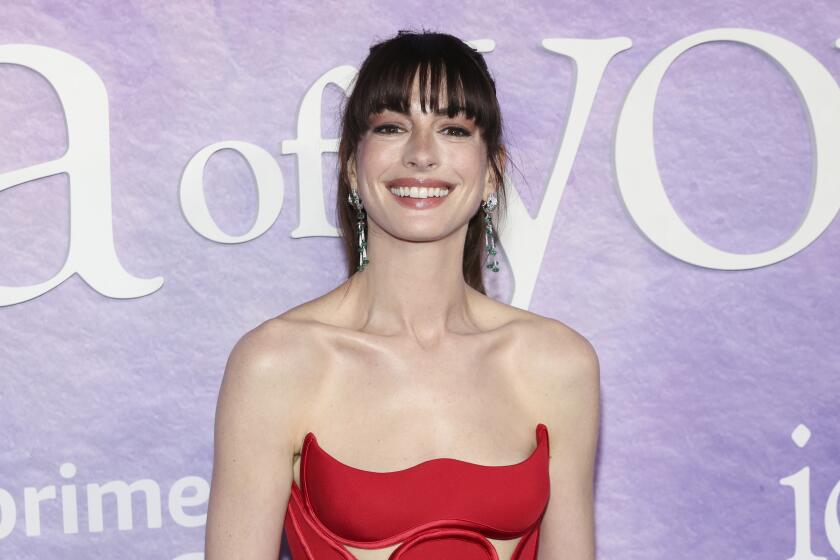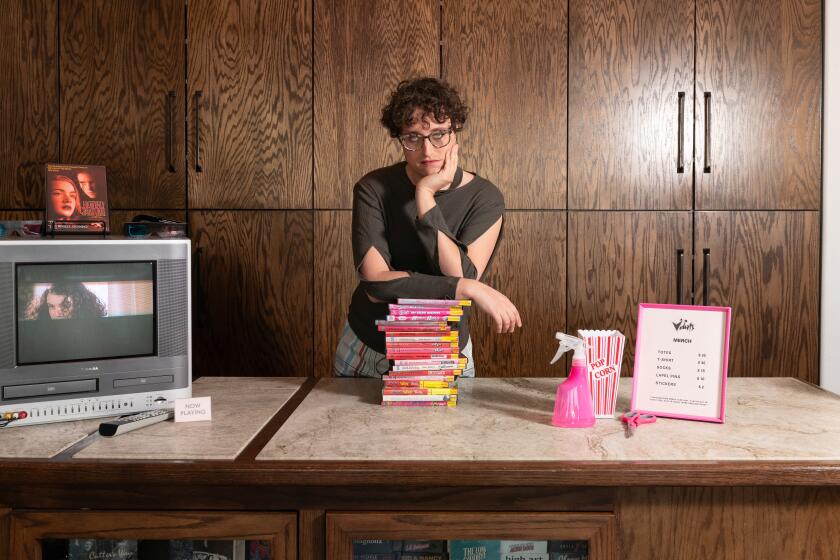British reserve -- and French passion
Back in the summer of 1986, Kristin Scott Thomas was poised to make her feature-film debut in “Under the Cherry Moon” opposite Prince when she got pulled aside by a somewhat exasperated producer. The starlet simply wasn’t exhibiting the necessary hunger for Hollywood.
“He came in and said, ‘We’re going to do the promotion now and I need to know: Do you want to be a star?’ It was a strange question to me,” Scott Thomas recalled recently over lunch at a posh London restaurant. “I thought, ‘Why on earth is he asking me that? Clearly I’m not approaching this the way I’m supposed to.’ But my answer was, ‘No, not really.’ ”
The memory was punctuated by a complicated sigh and expatriate smile: The 51-year-old British-born actress, who has lived in Paris since 1980, has made close to 50 movies but at this point seems to have dual citizenship between French film and the British stage. At this point in her career, Hollywood seems a rather foreign territory.
This Friday, her latest movie, “Sarah’s Key,” arrives in theaters with a heart-wrenching tale of Paris that is split between two eras -- the film moves back and forth between today and the dark days of 1942 -- and relayed in two languages, French and English. She is also starring now in Ian Rickson’s high-profile revival of Harold Pinter’s “Betrayal” in London’s West End.
Those two endeavors are far removed from, say, her work in “Mission: Impossible” or “Four Weddings and a Funeral” and “The Horse Whisperer.” But neither will surprise fans who have watched the Oscar-nominated actress explore forlorn landscapes in “The English Patient,” “Leaving,” “I’ve Loved You So Long” and “Angels & Insects.”
Scott Thomas was older than 40 when she first stepped onto a major stage in Paris in 2002, in the title role of the Jean Racine tragedy “Berenice.” That moment -- and that “Cherry Moon” conversation -- are revealing coordinates in her journey toward “actress” and away from “movie star.”
“I came to the stage very late and it’s made me far, far braver,” Scott Thomas said. “There’s something about always wanting to be liked -- on film you want to be liked or seen sympathetically. I tried to make the characters that are unsympathetic somehow likable and now I’m not like that at all.... It was more about me before -- ‘Look at me, look at me, look at me’ -- hiding behind this role. Now it’s different.”
“Sarah’s Key” is an especially personal film for Scott Thomas. When she was not yet 20, she moved to France to be with her husband-to-be, physician Francois Olivennes, and in their years together (they separated in 2006) she learned through her Jewish in-laws and extended family about the wartime horrors French Jews faced at the hands of Parisian authorities.
“I wanted to make a film [about French Jews] and at one point was asked to make a film that was a reconstruction of the events, but I couldn’t do it,” Scott Thomas said. “I would have kept thinking about my aunts who really did go through that. My acting abilities end there ... one of [my ex-husband’s] uncles worked in the place where they put all the bodies after the gas chamber and he actually found his own children. It was too much for me. I can’t even go there.”
“Sarah’s Key” provided Scott Thomas with what she calls “the perfect answer to my quest.” The story, based on the 2007 novel by Tatiana de Rosnay, is about two people: Julia Jarmond (Scott Thomas), a modern-day, American-born journalist living in Paris who is digging into the city’s wartime history; and young Sarah Starzynski (Melusine Mayance), a Jewish child in the 1940s whose family is splintered during the Vel’ d’Hiv Roundup -- named after the Velodrome d’Hiver, or Winter Velodrome, bicycling racetrack in Paris where Jews were taken.
“This was my way into it -- in the role of a compassionate witness, someone who becomes emotionally involved in the past but can’t do anything about it,” Scott Thomas said. “That’s very much how I feel. The way it goes back and forth in time was very clever and makes the story interesting; sometimes you feel lost and then you find your feet again.
“It also takes the consequences of the past and throws them again and again into the present,” she added. “What we do as humans and as a society has a lasting effect, even if those consequences don’t present themselves in obvious ways at first.”
Her past is a scrapbook with fearsome loss in its early pages. When she was 6, her pilot father died in a crash; five years later her stepfather died, shockingly, in almost identical circumstances. Scott Thomas was sent to boarding school, and, like one of the remote characters she often plays, she began to build emotional barricades. Those remained in place when she became a patrician face on the silver screen.
“When I was making big movies and was ‘a star,’ I felt almost afraid of audiences, I felt very defensive and it was always ‘Love me, love me, love me,’ but that turns into other things,” Scott Thomas said. “People see you on such a big screen or they see you in their living rooms and for many of them it creates a weird, ambivalent relationship with you as an actual person. You go into a shop and ask for something and they just stare at you with their mouth open. You can’t get anything done!”
The star power remains in many ways, although Scott Thomas is now best described as an actor’s actor. “She is amazing to work with,” said Gilles Paquet-Brenner, the director of “Sarah’s Key.” “She does amazing work and just brings an authenticity to every moment. I feel like she could do my job probably better than I could. In this movie, though, she is perfect for this role. No one else could play this -- a woman living in France in this way -- the way Kristin can do it.”
Scott Thomas has become a major presence in French cinema -- “She belongs to France now,” is how Paquet-Brenner puts it -- and not only does she enjoy the nuances of the language, she also welcomes the vivid female roles she finds on the pages of American and British scripts.
“The French scripts have these slightly loopy women -- it’s much more fun than just standing there on screen and being arch and bitter,” Scott Thomas said. “I don’t want to be bitter on screen. I’m bored with it. I don’t want [the marquee of my] career retrospective to be ‘The Cinema of Bitterness.’ ‘The ‘Cinema of Regret,’ maybe, but not bitterness. There’s something about the way Anglo Saxons look at women my age. There’s something about faded beauty and regret in all of the roles. There are no roles for women my age that are like, ‘Bring it on!’ ”
--
More to Read
Only good movies
Get the Indie Focus newsletter, Mark Olsen's weekly guide to the world of cinema.
You may occasionally receive promotional content from the Los Angeles Times.






